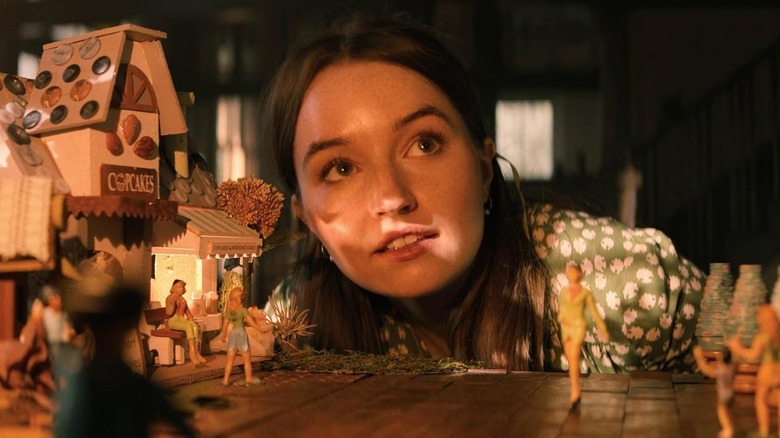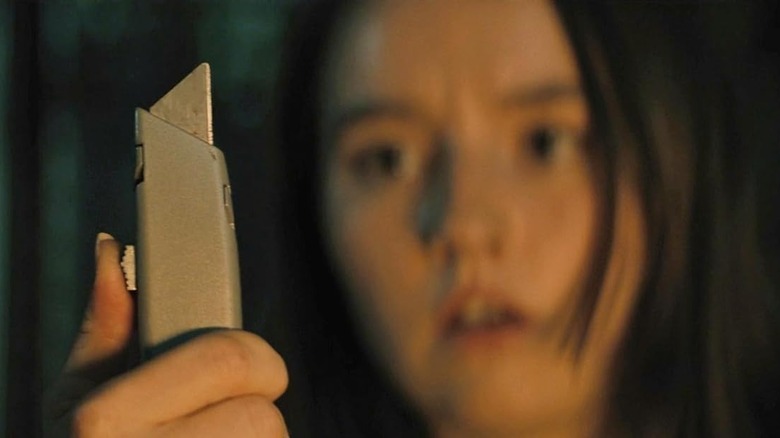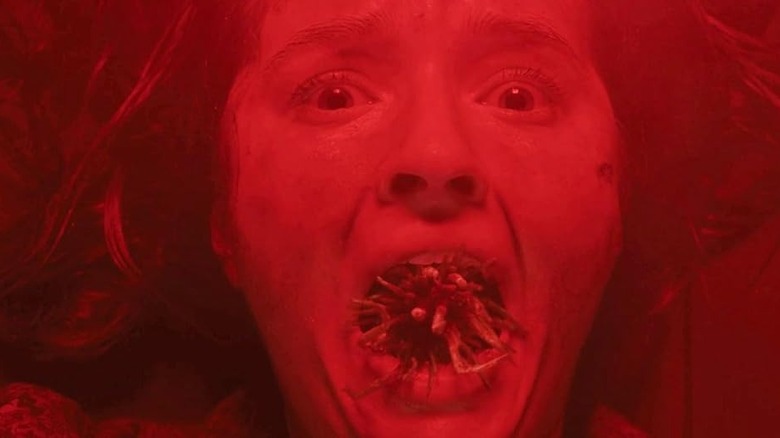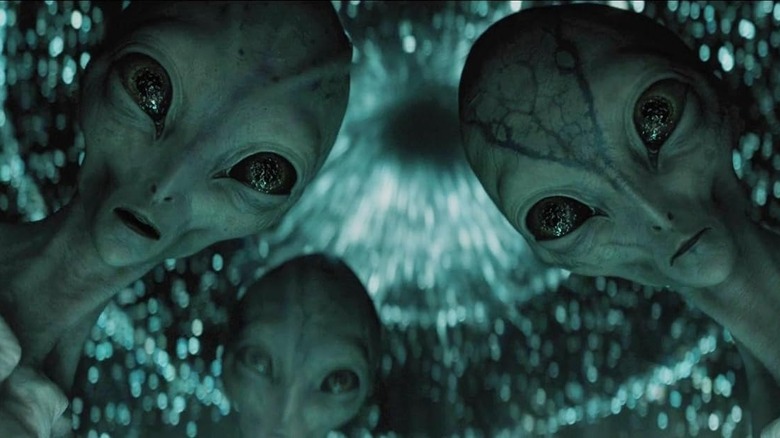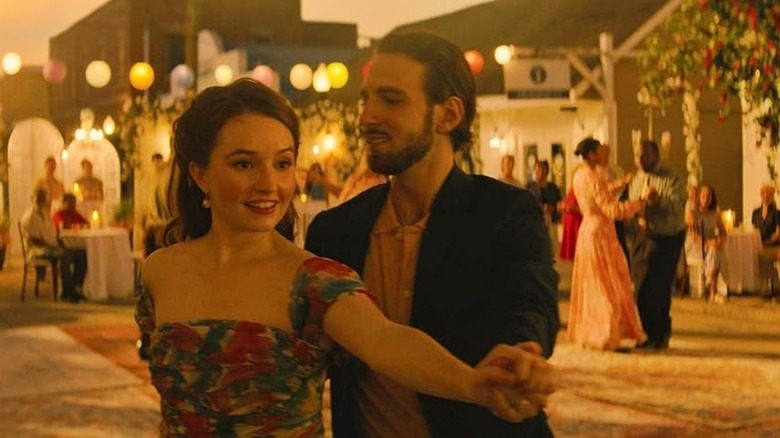No One Will Save You Ending Explained: I'm Dancing With Myself
When you weren't looking, Brian Duffield snuck in and suddenly became one of the coolest names in original genre cinema. With his scripts for the slasher comedy "The Babysitter," the deep sea survival horror-thriller "Underwater," and the post-apocalyptic monster movie "Love and Monsters," Duffield has demonstrated a clear appreciation for not just the tropes of specific genres but also how to use them (and when to subvert them) to explore the human condition.
Much like his feature writing/directing debut, the teen horror rom-com "Spontaneous," uses the metaphor of high schoolers spontaneously combusting to talk about the malaise that plagues everyone in the 21st century (but especially young people), Duffield's second movie as a writer and director, "No One Will Save You," is all about the universal struggle of making peace with the mistakes of your past when personal salvation seems impossible. That it's also a story about an alien invasion (a figurative "act of god," if you will) only further invites a deeper reading of the film as a religious allegory by way of a feature-length "Twilight Zone" homage. In this interpretation, the brave (and strange) new world ushered in by the invading extra-terrestrials at the end acts as a thoughtful commentary on the concept of heaven and what it actually entails.
Now, obviously, this reading would quickly fall apart if "No One Will Save You" didn't work purely on a surface level as an economic sci-fi horror flick (one with virtually no actual dialogue) about a person resisting an alien invasion with all the might they can muster. So, before we delve any further into the film's spiritual overtones, let's go over what literally happens on screen.
What you need to remember about the plot of No One Will Save You
Kaitlyn Dever stars in "No One Will Save You" as Brynn, a young woman who resides alone on the outskirts of a small town called Mill River in her late mother's house (a lovely piece of real estate that would undoubtedly cost you an arm and a leg to buy if it wasn't in the middle of nowhere). Brynn herself leads a curious existence. Although she makes her living as a seamstress working at home thanks to the modern marvel that is the internet, she otherwise seems almost trapped in the past. She has a landline phone, wears vintage flower-printed dresses, listens to decades-old songs on her record player, and frequently spends her free time writing letters to her former childhood friend Maude.
It's not just Brynn who appears to be hung up on events that transpired long before the film starts. Many of the locals act hostile if she dares to so much as wave at them. Meanwhile, Brynn goes out of her way to avoid certain people, specifically a melancholy-looking middle-aged couple. It doesn't take a whole lot of reading between the lines to deduce that this is all related to Maude and a mysterious tragedy that befell her roughly a decade ago, leaving Brynn stuck living in an almost purgatorial state where nobody will let her move on from what happened, not least of all herself. It feels like nothing short of a world-shattering occurrence can change things for her, either. Luckily (if that's the right word for it), who else but an armada of grey-skinned other-worldly beings with dark eyes and enlarged craniums in flying saucers should show up at Brynn's place one night to try and take over the world?
What happened at the end of No One Will Save You?
For someone who comes across as meek and docile as Brynn, she's incredibly resilient in the face of the extra-terrestrial invaders. She's also remarkably resourceful, using everything from broken pieces of the small model town she's building in her home to her refrigerator doors, mops, pots of boiling water, and boxcutters to lead a "Home Alone"-style defense of her house against her uninvited guests. More intriguing still, the aliens themselves aren't as openly hostile as those in similar films like "Signs" and "War of the Worlds." True, they go around sticking tiny tentacled creatures down the throats of the locals to control their minds, which seems kind of rude. But at the same time, it's Brynn who causes a lot of the property damage that transpires during their battle. The aliens even put out a fire using one of their saucers' tractor beams at one point.
Their fight culminates in Brynn getting one of those tentacled creatures stuck down her throat, which leads to her imagining that she's in a world where her home is undamaged and Maude (whose face is never fully in focus) is grown-up, alive, and well. Seeing through this illusion, Brynn forcibly extracts the creature from her mouth and tries to flee, only to get sucked up into a giant saucer where the aliens probe her mind. In doing so, they discover that Brynn accidentally killed Maude by hitting her head with a stone during a scuffle 10 years ago. Yet, rather than trying to force another mind-controlling creature on her, the aliens just ... let her go. The last scene then shows Brynn living happily among the mind-controlled residents of Mill River, who are friendly to her and even invite her to one of the town's dances she's been practicing for.
What the end of No One Will Save You means
There's nothing to prevent you from taking the ending and even the title of "No One Will Save You" at face value. Brynn is someone who's spent her whole life trying to make amends for a terrible mistake she made as a child. As much as she's fueled by her survival instinct to resist the aliens, you also get the sense she's fighting for something more. The extra-terrestrials certainly recognize this, which is the reason why they probe her mind, trying to understand why a human would rather continue resisting them tooth and nail than live in the euphoric dream state induced by the mind-controlling creatures. When they glimpse her traumatic past, they appear to realize that all Brynn really wants is a second chance — even if that means having to live in a world of alien-controlled people to get it.
Alternatively, you can look at "No One Will Save You" as a religious parable about the elusiveness of salvation. In this light, the aliens are the god(s) whose machinations are difficult for us puny humans to truly comprehend, much less boiled down into simple black-and-white terms of good and bad. For as much as Brynn seeks personal redemption for what she did to Maude in her daily life, she must also endure a series of trials and tribulations in the eyes of the film's "gods." That includes facing the ultimate temptation in the form of a false version of heaven: one that requires no active effort on her part, just submission. But Brynn doesn't want to live in a fantasy where she can just pretend Maude is still alive, she wants to actively earn her salvation by living with her inner pain (as any true person of faith would).
What Brian Duffield (and Guillermo del Toro) has said about the ending
If you don't want to take it from me, take it from Guillermo del Toro. In a thread on Twitter, the filmmaker (who knows a thing or two about fairy tales and parables) noted that "No One Will Save You" embodies "an essential principle in Catholic dogma (thus you may choose to refute it or embrace it) that serves as a narrative backbone: Grace and salvation emerge from pain and suffering. It is in this passage that you find salvation." He continued, explaining:
"You will save yourself through this. You can find it in the Book of Job — In Jonah in the Whale and in fact in many other religions. The world — the essence of it — is a paradoxical composite of destruction and creation. Any human-scale attempt at suppressing one side results in strife. Because the universe doesn't play nice. Period. I think the key is the moment of 'communion' through the eucharist of the alien identity pod. It is profound."
Duffield has supported del Toro's reading, responding on Twitter, "I don't think Guillermo even knows I'm a missionary kid that grew up in Ireland so this is a wild Sunday morning."
This is also why the film's lack of dialogue is more than a fun stylistic choice. Actions speak much louder than words when it comes to having true faith and achieving salvation, which is how Brynn earns her ending. Is it a happy ending? A bittersweet one? A twisted one? Probably all three. Nobody's life is as picture-perfect as the model town Brynn builds in her home, but that's okay. Better to be dancing on your own in a life of your choosing (as Brynn is in the film's final shot) than settle for a pretend version of heaven.
